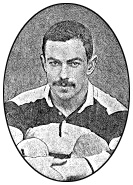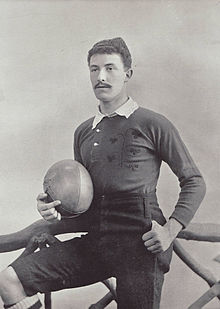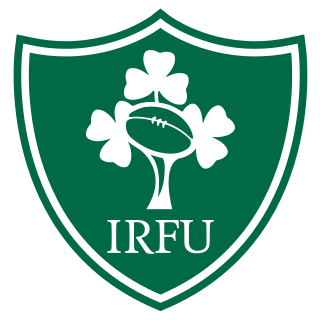The 1889 Home Nations Championship was the seventh series of the rugby union Home Nations Championship. Three matches were played between 2 February and 2 March. It was contested by Ireland, Scotland and Wales. England was excluded from the Championship due to their refusal to join the IRB.
Frank Hill was a Welsh international rugby union forward who played club rugby for Cardiff. Hill won 15 caps for Wales over a period of ten years and was given the team captaincy on four occasions.

Ralph Bond Sweet-Escott was an English-born international rugby union half back who played club rugby for Cardiff and was capped three times for Wales. Sweet-Escott also played cricket for Glamorgan representing the county in the Minor Counties Cricket Championship. His brother, Edward Sweet-Escott, was a notable cricketer for Glamorgan.
Frederick 'Fred' Charles Parfitt was a Welsh international rugby union scrum-half who played club rugby for Newport, regional rugby for Somerset and was capped nine times for Wales. On retiring from rugby union, Parfitt switched to bowls and also represented Wales in this sport.
William Douglas was a Welsh rugby union back who played club rugby for Canton RFC, Cardiff and international rugby for Wales. Douglas was also a rugby referee, and officiated over four international matches.

Selwyn Hanam Biggs was a Welsh international rugby union fly-half who played club rugby for Cardiff and county rugby for Glamorgan. Both Biggs and his brother Norman played international rugby for Wales, though they never played in the same match for Wales together. Biggs was described at the time as a 'certain tackler' and a 'fast, good dodger'. Biggs also played cricket for Glamorgan and was part of the team to face the touring South Africans in 1895.
William Llewellyn Thomas was a Welsh international rugby union player who played club rugby for Newport, international rugby for Wales and invitational rugby for the Barbarians. He was educated at Christ College, Brecon and later while at Oxford University he achieved a sporting Blue.
William Edward Osborne Williams was a Welsh international rugby union forward who played club rugby for Cardiff and London Welsh. Williams was capped for Wales five times over a period of four years.
Henry Percy Phillips OBE was a Welsh rugby union international fly-half who played club rugby for Newport. He won six caps for Wales and played in all three games of the 1893 Home Nations Championship which saw Wales lift the Triple Crown for the first time in the country's history.
Henry "Harry" Thomas Day was a Welsh international rugby union forward who played club rugby for Newport and Cardiff. Day was awarded five caps for Wales, and was most notable for being part of the 1893 Welsh Triple Crown winning team. A carpenter by trade, he was also the uncle of Harry Phillips, who was also a Newport player who represented Wales.
John "Jack" Elliott was a Welsh rugby union scrum-half who played club rugby for Cardiff and international rugby for Wales, winning three caps.
Piercy Henderson "Dolly" Morrison was an English rugby union three-quarter who played club rugby for Northern and Cambridge University and played international rugby for England.

Aloysius Mary "Louis" Magee was an Irish rugby union halfback. Magee played club rugby for Bective Rangers and London Irish and played international rugby for Ireland and was part of the British Isles team in their 1896 tour of South Africa.
Darsie Gordon Anderson was an English-born rugby union half back who played club rugby for London Scottish. At international level he represented Scotland winning eight caps over four seasons.
Charles Alexander Hooper was an English rugby union forward who played club rugby for Cambridge University and Middlesex Wanderers and international rugby for England. In 1890 Hooper became one of the original members of the Barbarians Football Club.
William Ernest Bromet was an English rugby union forward who played club rugby for Oxford University and Tadcaster and county rugby for Yorkshire. Bromet and was a member of the first official British Isles tour in 1891 and represented England on twelve occasions between 1891 and 1896. Bromet was a part of the 1892 Triple Crown winning team for England.

Charles Gurdon was an English rower and rugby union forward who played club rugby for Cambridge University and Richmond. Gurdon represented England fourteen times during the early development of international rugby union, once as captain. He and his brother Edward Temple Gurdon formed one of the most notable sibling pairings in English rugby.
Charles Edward Wilson was an England rugby international and British Army officer who was killed during the First World War.
Joseph Thomas Magee was an Irish rugby union wing. Magee played club rugby for Bective Rangers and played international rugby for Ireland. He is often mistaken as being a member of the British Isles team that toured South Africa in 1896, a position actually taken by his brother James Magee.












